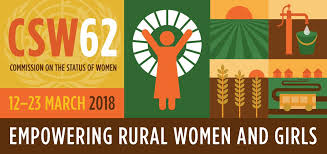UN: 62nd Commission on the Status of Women
The 62nd session of the Commission on the Status of Women took place at the UN in New York from March 12-23. Representatives of member states, UN entities, and NGOs from all regions of the world attended. A total of nine Maryknoll Sisters, including Srs. Marvie Misolas, Veronica Schweyen, and Mary Ann Smith, were participants.
The 62nd session of the Commission on the Status of Women took place at the UN in New York from March 12-23. Representatives of member states, UN entities, and NGOs from all regions of the world attended. A total of nine Maryknoll Sisters, including Srs. Marvie Misolas, Veronica Schweyen, and Mary Ann Smith, were participants. The following article was published in the May-June 2018 issue of NewsNotes.
The 62nd session of the Commission on the Status of Women (CSW62) was held at the United Nations in New York in March. The theme was “challenges and opportunities in achieving gender equality and the empowerment of rural women and girls.”
“Worldwide, almost one-third of employed women work in agriculture,” Under-Secretary-General of the UN and Executive Director of UN Women Phumzile Mlambo-Ngcuka said in her opening remarks. She described the 400 million women who are farm workers as mainly smallholder farmers and agricultural and informal workers with little or no social protection, and almost no visibility.
“The world eats every day because they toil,” Mlambo-Ngcuka said.
Over two weeks, hundreds of side events and parallel events were offered; one, entitled, “Tackling Climate change through the empowerment of rural women,” asked panelists to provide innovative approaches, tested good practices and policy guidance around “unlocking rural women’s great potential in agriculture, food security, and nutrition policies in the context of climate change.”
Speaking from their experiences as policymakers, development agencies, NGOs and representatives of international climate change mechanisms, panelists agreed that there exists “clear evidence that climate change is having gender-differentiated impacts, and in many cases is intensifying the constraints that already place women, especially those that are reliant on agriculture for their livelihoods, at a great disadvantage.”
For example, in developing countries, climate change affects the availability of surface water and as a result rural women, who are usually given the task of fetching water, have to cover greater distances to collect the water, increasing their already substantial workload.
Women and girls face unique challenges and discriminatory practices such as female genital mutilation, forced marriages, and discriminatory land politics. For example, only 13 percent of women own land they work despite making up 60 percent of the world’s agricultural workforce. By ending discriminatory laws and norms that sustain harmful practices, and by ensuring women’s’ access to innovative technology, credit, agricultural services, education, and decision-making authority, women farmers can respond to the changing climate, combat poverty and food security, educate their children, and contribute to peace in their communities.
“This is a tipping point moment,” Mlambo-Ngcuka said. “All over the world, we are witnessing an unprecedented hunger for change in women’s lives, and a growing recognition that when women band together they can bring about far reaching changes.”
Click here to find a list of events, videos, webcasts, speeches and statements from CSW62.
Factors affecting women’s political participation
Political and Electoral Systems
Women are elected in greater numbers (on average 6 percentage points higher) in systems of proportional representation (quotas) than they are in majority electoral systems.
Cultural Challenges
Prevailing cultural attitudes regarding the role of women and men in society affect not only how women are perceived by the electorate, political party leaders and the media, but also how women see themselves.
Socio-economic Challenges
Campaigns are costly and women face more barriers to access and control over finances than men. When deciding to run, women often hesitate to invest family resources, ask for credit, or spend more on domestic help.
Source: “Gender Sensitive Parliaments” a study produced by The Inter-Parliamentary Union, October 2016.

